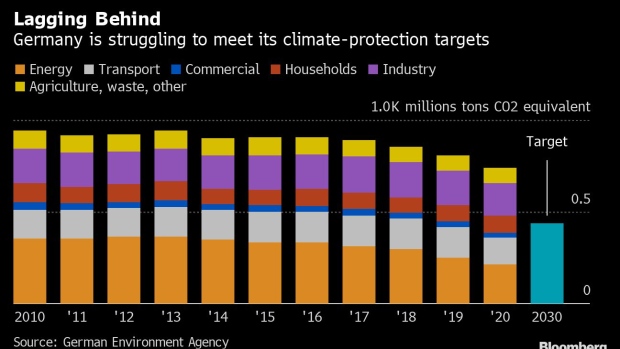Jan 20, 2022
Germany Courts BMW, Airbus in Bid to Speed Up Green Transition
, Bloomberg News

(Bloomberg) -- German Economy Minister Robert Habeck kicked off a charm offensive targeting major industrial companies and regional leaders this week as the government tries to accelerate its plan to cut emissions and meet elusive climate change goals.
Habeck will visit a BMW AG factory in Munich on Thursday after touring an Airbus SE facility near Hamburg earlier this week. The stops underscore that slashing emissions from transport will be one of the biggest challenges facing Germany’s new coalition government.
The tour comes a week after Habeck said the country needs to triple the speed of its emissions reductions to transform Europe’s biggest economy into a climate neutral state by 2045. Meanwhile, companies like Airbus and BMW are looking to Habeck to help spur more government spending to pick up the pace in the transformation.
“It’s a task with gigantic dimensions”, Habeck said Tuesday. “Not a day should be wasted.”
The European Union last year proposed an effective ban on the sale of new petrol and diesel cars from 2035, adding urgency to the electric model rollouts of the continent’s automakers including Volkswagen AG, Daimler AG and BMW costing tens of billions of euros.
At BMW, Habeck is likely to hear more about the need for Germany to dramatically increase infrastructure to push the transition to electric vehicles. The new German government has said it wants 1 million public charging points by 2030, the majority of which it wants to be fast charging points. There are currently just over 50,000 public charging stations in Germany, and only 7,700 of those are fast charging points.
The three-way coalition of center-left Social Democrats, environmental Greens and business-friendly Liberals plans to have at least 15 million fully electric vehicles on Germany’s roads by the end of the decade. So far, only 670,000 pure EVs drive on Germany’s roads, accounting for just over 1% of the nation’s fleet.
Habeck, during his visit to Airbus on Tuesday, faced similar pleas for the government to more aggressively finance the energy transition. Airbus is pushing for Germany to subsidize the development of hydrogen-powered airplanes, and the head of the company’s research center, Nicole Dreyer-Langlet, reminded Habeck of a request for research funds. Habeck promised to speed up the review process and also lobby for the project in Brussels.
But even with billions of investments, it will take many years until the vision of emission-free airplanes will become reality. Until 2025, Airbus wants to decide which hydrogen technology looks most promising for further development. The first hydrogen-powered aircraft is supposed to fly ten years later, in 2035.
©2022 Bloomberg L.P.


